Note
we already know that Diomedes is later deified. how would you see Odysseus, Penelope and Telemachus being deified?
Penelope as Goddess of Marriage or Good Governance (there's actually a really good article on Penelope's role of Regent in Ithaca/showing in comparison to her contemporaries who did not hold such political power). I wouldn't say weaving but I suppose that too.
With Odysseus, you could go with God of Journeys – which would flow well considering he's Hermes' great-grandson too – or God of Strategy, considering his exploits but also because he receives Athena’s patronage.
Telemachus becomes consort to Hermes or something /hj
52 notes
·
View notes
Text
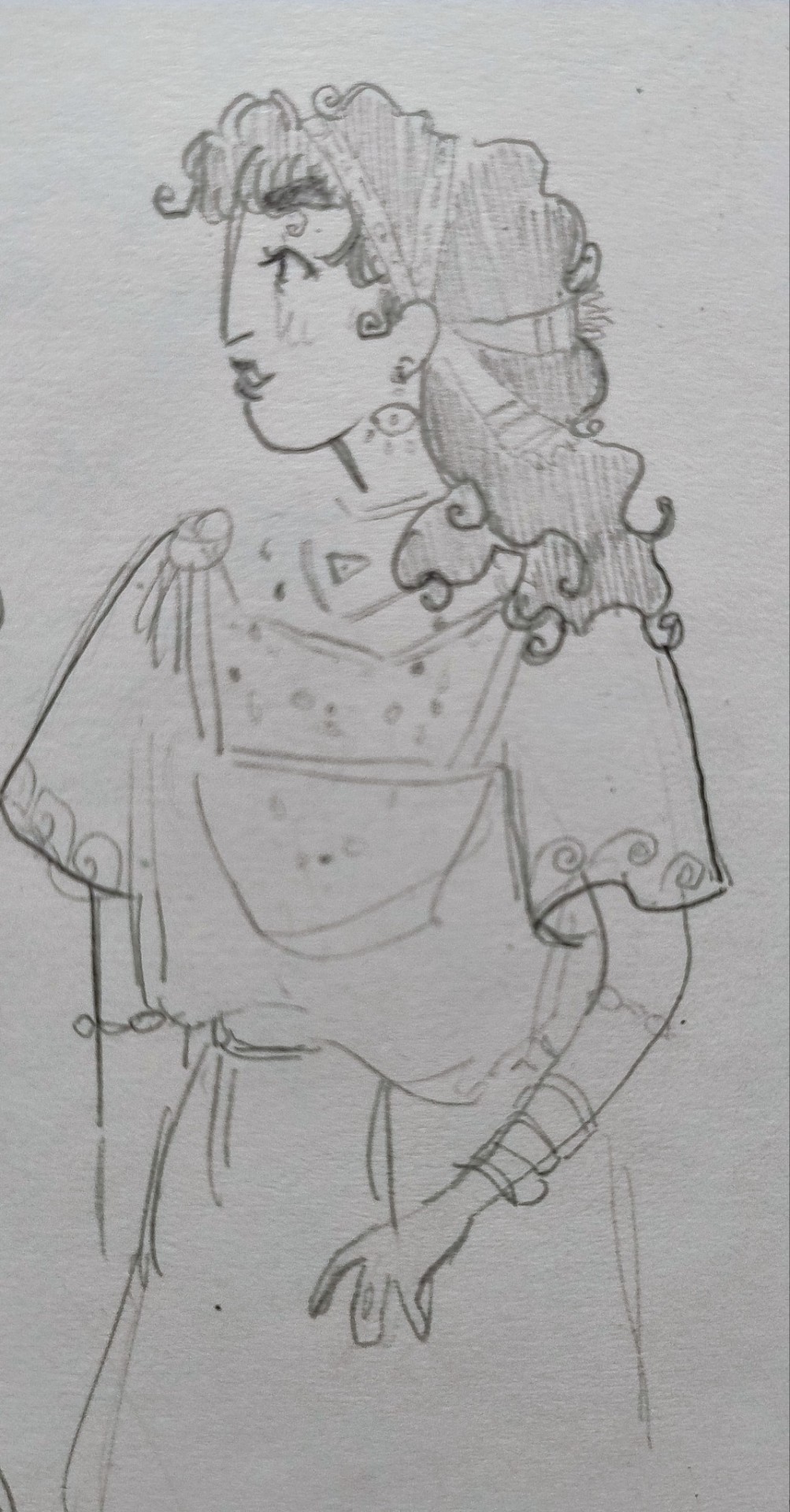
My Cassandra design
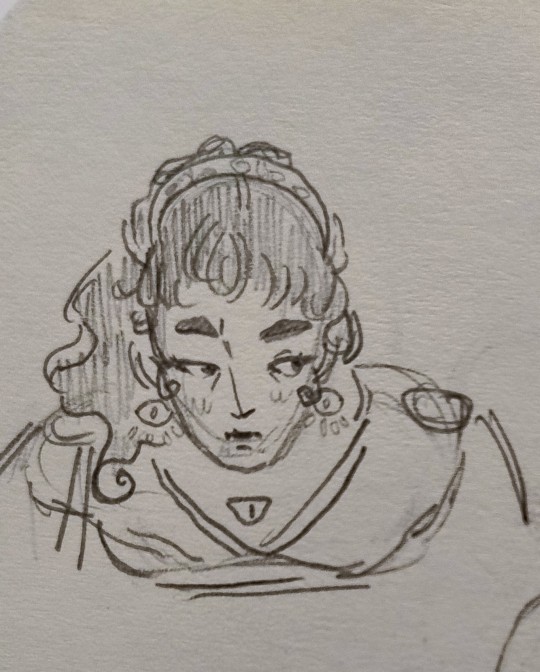
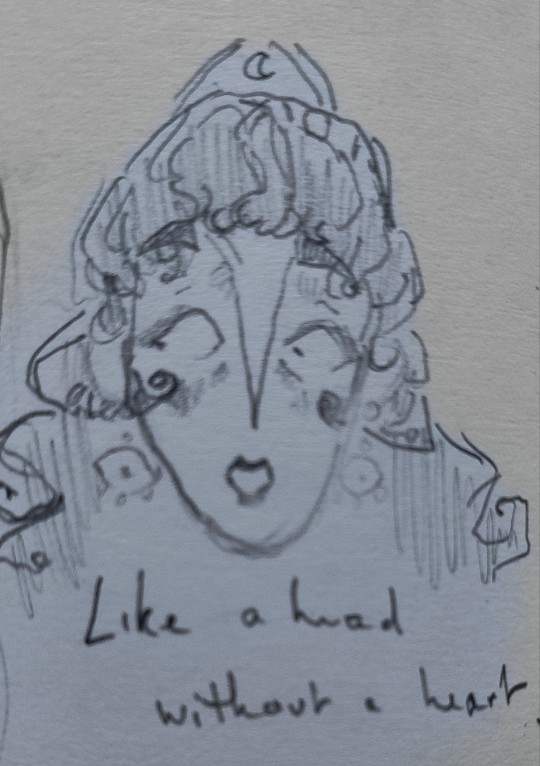
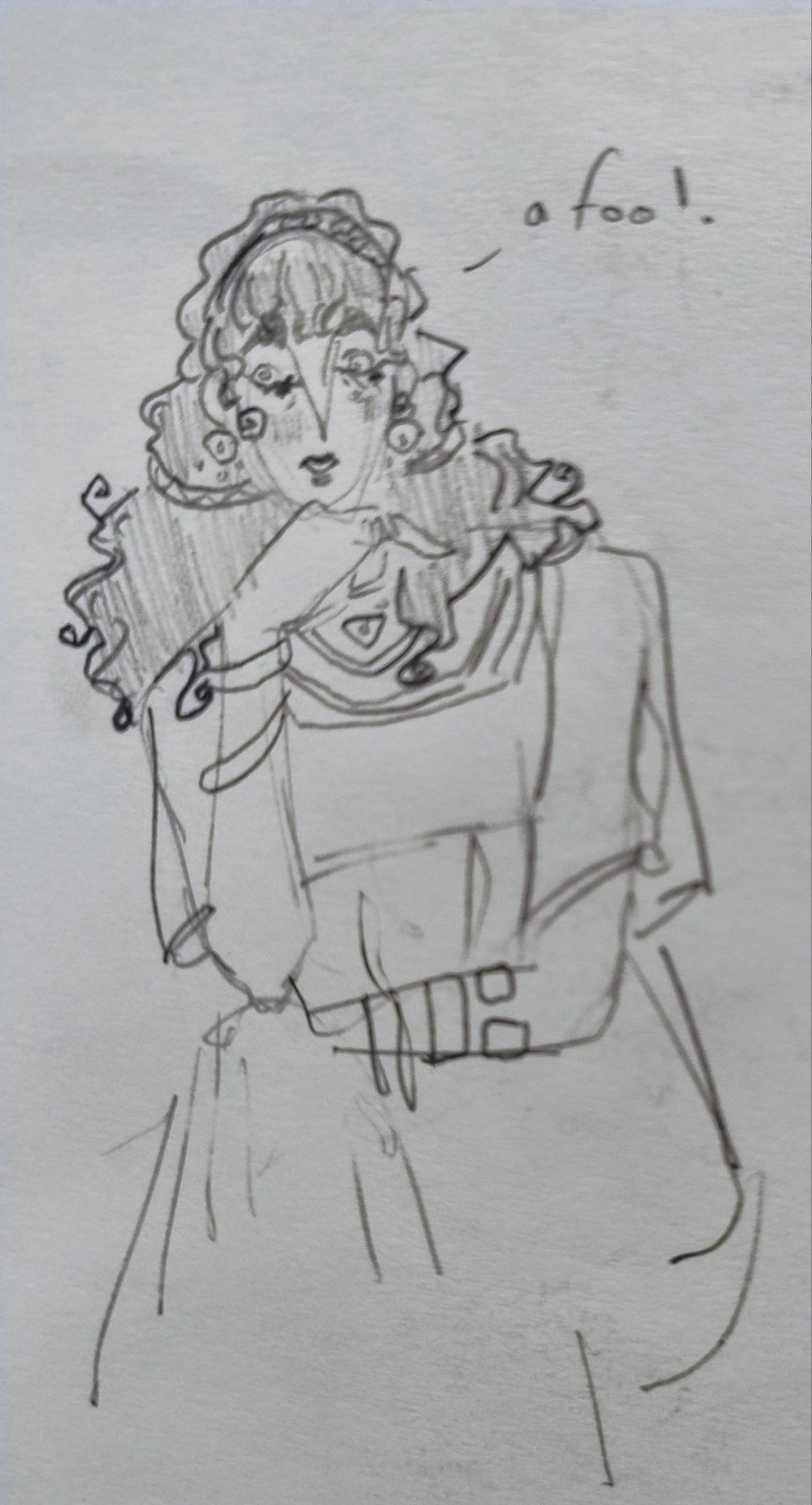
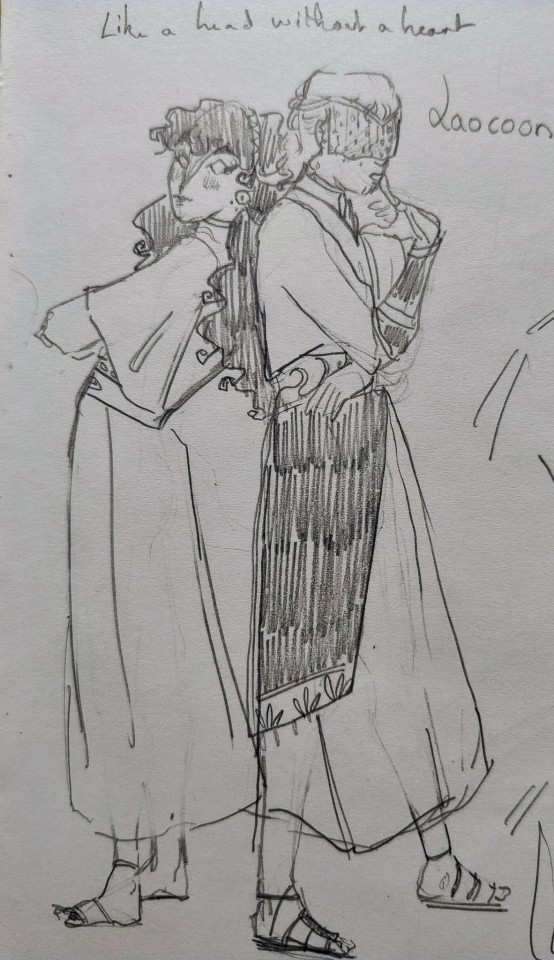
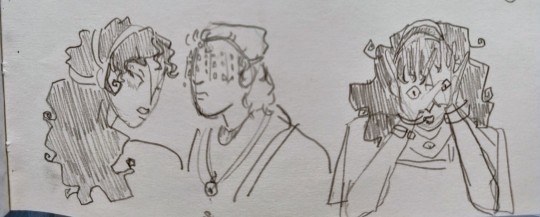
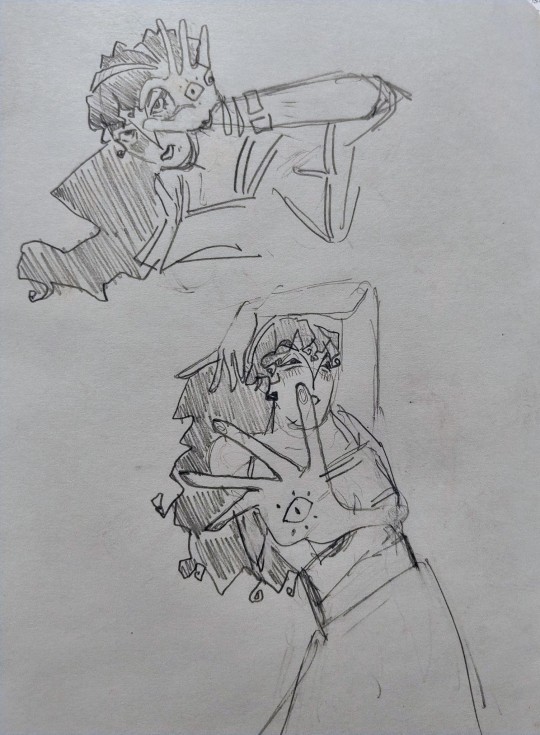
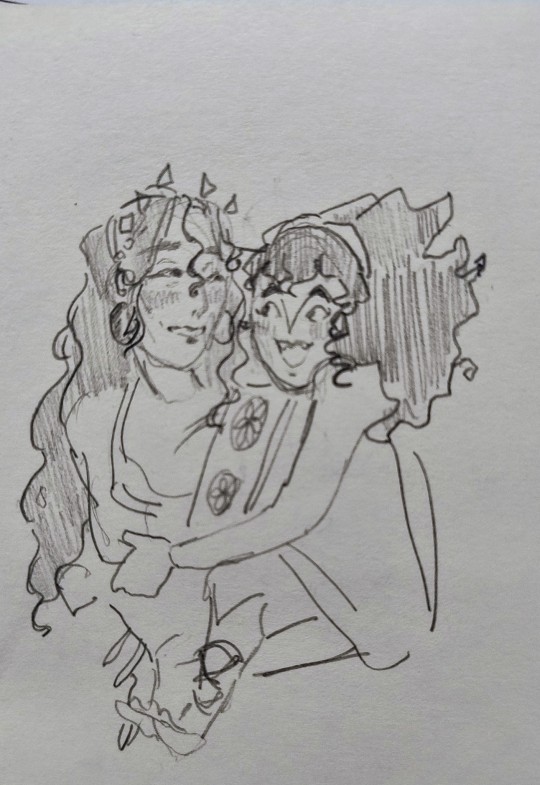
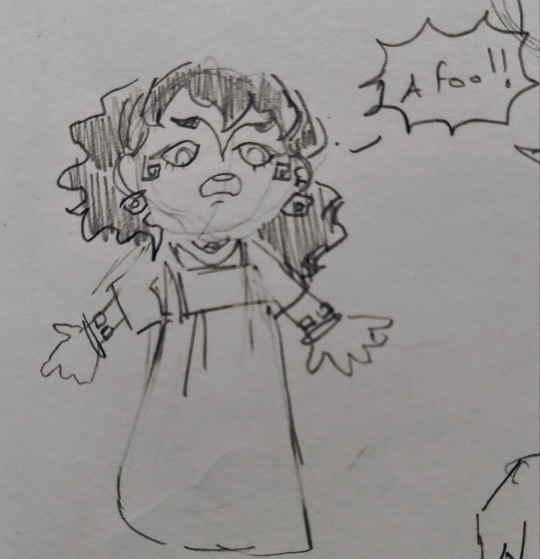
This song destroys me every time I listen to it. My girl deserves the world and a good relationship with her family 👍
71 notes
·
View notes
Text

Ajax and Achilles playing dice they're so silly. Also the age of the characters in the Iliad are completely abstract to me... So yeah Ajax in my heart is way older
245 notes
·
View notes
Text
A lot of people like the headcanon that Aphrodite appears differently to each person depending on what their ideal of beauty is, but I don't think we talk enough about the potential of Helen doing the same thing.
Leda gives birth to the daughter of Zeus, and everyone says she is the most adorable baby they have ever seen. But no one can agree on the color of her hair or the shape of her features. When the young Helen looks in the mirror, she thinks she looks just like her big sister, the most beautiful woman she can imagine. But when she says as much to Clytemnestra, her sister is confused. Helen is unlike any woman she has seen in Sparta, she says, with forest-green eyes and hair like sunlight on wood.
Helen starts training with the other girls, and she sees less and less of Clytemnestra in her reflection. Instead, she sees the warm brown eyes of the visiting prince who smiled at her across the table, the square jaw of the girl who pinned her in wrestling practice and shot her a wink before she rose. The sons of Atreus come to stay in Sparta, and after a few conversations with the younger brother, Helen finds that her hair has turned his exact shade of red. It stays that way for months after he leaves, and so when scores of suitors arrive hoping to claim the woman of their dreams, he is the one she picks. And they rule together, and laugh together, and lie together, and he tells her that he loves her. But in the long hours of the night, she can't help but wonder if he would still say so if her face wasn't perfectly tailored to his desires.
She is the woman of every man's dreams, and so of course she is the perfect prize for the goddess of beauty to promise the Prince of Troy. With Paris, it is never a question of whether or not he loves her- if she were not a perfect beauty in his eyes, he would have stayed with his first wife, with whom Helen is certain he had more to talk about. In Troy, she is never just Helen. The women look at her and they see the sister that was taken in a raid, the husband that was killed on the battlefield, and they despise her.
And are the Greeks any better? Her unnatural beauty called them to the shores of Sparta all those years ago, drove them to make a pact that only one of them stood to gain from. They have been at war for ten years because of her, they mutter, and so they despise her too. But when they have her in their clutches at last and they gather together to stone her to death, she lifts her veil, and the stones drop from their hands. She bears the face of the wife they have spent ten years yearning for, the lover they lost to a Trojan blade, and not one of them can bring themself to kill her.
The gift of her beauty saves her life, and the curse of her beauty condemns her. Because for the rest of her life, she will be the most beautiful woman in the world, a woman who brought so much suffering and death simply by existing, a woman who escaped the war unscathed but bears the face of every soul lost in it. She will always be someone else's Helen, and she will never know who she is when no one is looking.
502 notes
·
View notes
Text
So lately I’ve been seeing a lot of posts asking people to stop trying to make Odysseus look nice in their works cuz he’s a “messed-up person in the mythology”. Your opinion is valid however I have but one thing to point out:
You want to know who started all this? Who started to “make Odysseus look nice” in the first place?
It’s Homer. It’s nobody else but Homer himself.
A non-Homeric Odysseus would try to murder people out of his own interests. He’d murder Palamedes without remorse (and we’d be cheering over this but it’s a murder after all), he’d attempt to murder Diomedes just to get the Palladium himself, he’d volunteer to kill Astyanax…meanwhile you wouldn’t find any mention of either Palamedes or Nauplius in Homer’s poems, neither did he mention anything abt the Palladium heist (and Diomedes necessity did not happen until Conon’s version), the death of Astyanax, the distribution of war prizes, etc. And all the details in the Odyssey seemed to deny the existence of Nauplius’s vengeance at all, so Odysseus would not take any of the blame.
A non-Homeric Odysseus would be depicted as “cruel, treacherous”, meanwhile in book 10 of the Iliad Odysseus was not mentioned to have killed anyone during the marauding, neither did he promise Dolan anything at all. The negative interpretations are denied by these details subtly put by Homer.
A non-Homeric Odysseus would be widely known as a “coward” for only shooting arrows from afar. But Homer gave him a spear and had him absolutely slaying in both the Iliad and the Odyssey. That part of Ajax’s speech was invalid already.
Most importantly—a non-Homeric Odysseus would be having kids everywhere else, and the loyalty to his own wife as seen in the Odyssey is no where to be found. Meanwhile his lineage was a single-son line made by Zeus in the Odyssey, and his love for Penelope was one of his main drives, especially seen in book 5 of the Odyssey. He loved his family as a loving parent—something you don’t get to see in most of the non-Homeric writings—for most of the time they followed a different tradition indeed, in which Odysseus wasn’t half as nice as in the Odyssey.
TL;DR: in case you haven’t noticed, the characterization of the Homeric Odysseus was quite different from a non-Homeric version of Odysseus. It’s not that Homer didn’t know of the existence of other versions—he knew them too well, which is why in his version of the story, you don’t get to see any mention of them.
325 notes
·
View notes
Text
Diomedes is not so fundamentally different from his father.
I HAVE DELIVERED
After months of dragging my feet, I finally fished it! (in 4 hours holy shit) and I'm kinda proud of it, but this is probably also the product of my excessive overthinking, but with not further ado, let's begin!
Let’s start with the basics: Tydeus was known for being a wild, out-of-control warrior. His rage was legendary. Diomedes? On paper, he’s the golden child: loyal, calm, respectful, chosen by Athena herself.
But that image of diomedes comes crashing down the moment you dig deeper into his character
On the surface, Diomedes is framed as the “better” version of his father, Tydeus: more disciplined, more strategic, favored by Athena instead of punished by her as stated previously. The Achaeans respect him (not so much leave the poor boy alone let him have his moment instead of comparing him to his father), the gods empower him, and Homer seems to elevate him as the model warrior.
But as i said, when you dig into the text, really look at what Diomedes does, how he fights, how he speaks, you start to see something much deeper and darker: he's not all that different from Tydeus at all when you think about it.
Reading the iliad but focusing on diomedes character its as if he’s constantly on the edge, just barely containing something
he’s a machine of destruction. He slaughters Trojans left and right, wounds Aphrodite without hesitation, and goes after Ares, the literal god of war. He only stops when Apollo himself tells him to back off—and even then, he makes a move again before finally being shut down.
That kind of divine defiance? That’s Tydeus-level rage. It’s just masked under a sheen of Athena’s wisdom and a more calculated cool. Diomedes may wear the face of the perfect Homeric hero, but there’s a savage streak that echoes his father’s madness, just barely held in check.
In the iliad book 10 dio and ody sneak in trojan teritory they catch dolon a trojan spie
Odysseus promises to spare him if he gives them info about the trojans and man sure does he spill
After that? Diomedes decapitates him.
He doesn’t just kill Dolon (after promising to spare him,) he slaughters him, strips him, and then goes on a joyride of death through the enemy camp. When they find Rhesus and his Thracians, Diomedes doesn’t blink—he kills twelve men in their sleep. And then he wants to keep going, like it’s not enough. It’s only when Athena, again, steps in and essentially says, “Okay, calm down now,” that he stops. In this book with Rhesus and the Thracians, Diomedes is already done. He’s already got what he came for. But instead of retreating, he chooses to kill—because it’s not about necessity. It’s about the desire to keep going.
And what’s so chilling about this is how pointless it is, tactically. After Dolon gives them all the info, they don’t need to go murder a dozen men. Diomedes chooses to. He gets no kleos, no divine reward. he doesn’t need a prize. The violence is the prize. He just does it. Because he can.
it’s explicit in the language Homer uses. Diomedes is in full battle ecstasy mode. described as moving like a lion among sheep, grinning and glorying in the chaos. he doesn’t just kill efficiently.
He revels in it.
He likes it, he thrives on the battlefield, and he enjoys bloodshed
"And the son of Tydeus, Diomedes, was glad in his heart as he struck down the men." Iliad book 5
"Glad in his heart" That phrase ("χαῖρε δὲ θυμῷ") pops up in a moments of sheer war ecstasy. It’s not just duty or valor—it’s joy. And when you see it describing Diomedes mid-slaying spree? That’s not your clean-cut hero. That’s a man dancing on the edge of madness.
it’s not just duty. It’s pleasure.
This illustrates how Diomedes isn’t just acting out of obligation not out of practicality, not out of necessity he’s relishing in the kill. It’s not just about the heroics or strategy; there’s an almost primal enjoyment in the violence itself.
The fact that he “was glad in his heart” tells you how far this man is from just being a noble warrior. He’s got that bloodlust burning inside him, and there’s an undeniable thrill in the destruction. It's scary how much he enjoys others suffering.
It’s clear that Diomedes, despite his noble status and divine favor, has that same chaotic, destructive edge his father Tydeus had—it’s just barely held in check.
That bloodlust? That JUST SCREAMS tydeus the difference?: Diomedes knows how to leash it. He’s not the monster his father was; he’s the tamer of that monster within himself. That restraint is what elevates him from being another brutal warrior into something greater: a true hero who chooses to remain in control, even when the thrill of violence is right there.
In fact, the only real difference is that Diomedes is simply better at pretending he’s in control. He puts on the face of the noble hero, but underneath, that same wildfire of rage, that same lust for blood, is burning—just like it was in Tydeus.
Diomedes doesn’t just embody the traits of a Homeric hero—he tests their limits. He walks a razor-thin line between earning immortal kleos and crossing into the kind of reckless savagery the gods despise. The same rage that drives his heroism threatens to tip him into hubris at any moment; and he gets away with it every time.
What makes Diomedes so compelling and so chilling is not that he lacks the ferocity of his father but that he’s better at hiding it. Tydeus is obvious in his rage; he makes no effort to conceal the monster he is. Diomedes, on the other hand, knows how to perform the role of the ideal hero: the noble warrior, the obedient champion of Athena
He’s not more virtuous—he’s just more strategic. He doesn’t kill less, or more cleanly, or even more justly. He kills with the same savage delight, but with the awareness to pull back just before he crosses a line that would cost him divine favor or mortal admiration. This ability to pretend, to wear a hero’s mask while feeding the same destructive instincts as Tydeus hiding the underlying madness behind that mask, makes Diomedes the more dangerous figure. Tydeus may have lost control; but Diomedes hides his control so well, it’s easy to forget what he’s controlling in the first place.
What makes this ironic is that Diomedes, despite all his bloodlust and near-madness, still (in some versions), gets the immortality that was denied to his father. Tydeus, who couldn’t contain his violent nature, ended up punished by the gods; he was denied the eternal glory he craved. Diomedes, on the other hand, dances on the edge of divine retribution, right there with him, and yet, he walks away with not just divine favor but immortality itself.
He’s not Tydeus 2.0.
He’s Tydeus 2.0 with better self-control
And honestly,
I think he kinda fooled all of us
252 notes
·
View notes
Text

Devious creature up to no good....😈will cause mischief
3K notes
·
View notes
Text
(The Return) Odysseus voice: I'm afraid to come home and have them say "is this all there is"
1K notes
·
View notes
Text
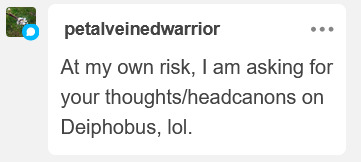
DEIPHOBUS TIME!
I'm honestly not entirely sure how I got such a deeply involved concept for his character and motivations, but I definitely did. I just feel like he fits into an especially interesting place in everything and that there's a lot of great potential with him.
Shout out to @petalveinedwarrior for enabling me and also I'm very sorry for being incredibly long winded. My bad.
Also DISCLAIMER! I am NOT an expert on the Trojan War and all its surrounding mythology lol. This is just for fun, based on my own fairly limited knowledge of the myths (though I think I pretty much cover everything that’s relevant to this). These are just my headcanons woven with some details from various myths. Sorry if anything’s missing or inaccurate!
SO!
-
First and foremost, I headcanon Deiphobus as the oldest of Priam and Hecuba’s children after Hektor.
Hektor calls Deiphobus the dearest of his brothers, and to me, this is why. They are the closest in age and they were the closest growing up, best friends when they were young. They also get the closest to being on equal footing which means a lot to Hektor, who often feels distance between him and his other siblings because of being heir to Troy.
Despite the relatively equal ground and Deiphobus treating Hektor with a very casual familiarity, deep down, he idolizes him. Deiphobus adores and admires Hektor, ever a younger brother in how he looks up to his strength and intelligence and reliability but close enough in age to not feel the same envy as so many of their younger siblings.
Deiphobus is aware that he is next in line to inherit the throne of Troy after Hektor, and the possibility of that is more real to him than to the rest. He doesn’t envy or want the responsibilities Hektor has to bear being the first son and admires him for it rather than resenting him. He never wants the weight of Troy on his shoulders.
Additionally, as close as they are, Hektor confides more openly in Deiphobus than the rest of their siblings. Consequently, he has a more realistic idea of both the burden he bears and also the ways he struggles to manage it like any human would.
Deiphobus holds Hektor in the highest regard- he means the world to him. It is a strange and unique combination of relating to and understanding Hektor exactly as he is and then loving him so dearly for how remarkably he seems to do in all of it, all that Deiphobus adores and strives to be like.
Hektor calls Deiphobus the dearest of his brothers, but Deiphobus would never need to say the same of Hektor, that much has always been obvious.
Deiphobus himself is ferociously loyal, boastful and fiery proud, wild and energetic, and always quick to smile and laugh with a sharp sense of humor. He’ll defend his own with tooth and nail, Hektor first and foremost, and they make a well balanced pair. Hektor’s level headed sense of responsibility softens many of Deiphobus’s rough edges, and Deiphobus’s enthusiasm breaks through many of Hektor’s more anxiously formed reservations.
Deiphobus would do near anything for Hektor, to a concerning degree in the eyes of some, but Hektor, by his nature, isn't overly controlling. He doesn't want Deiphobus to change how he is. Mostly, the only place Hektor truly pushes him is on moral grounds, for better rather than for worse.
Deiphobus hates to spend time overthinking anything, which benefits him in some ways, but also frequently has him following the example of those around him without considering what might lean towards cruelty. Hektor never tolerates hurtful and needless rudeness or otherwise, and their friendship doesn’t spare Deiphobus his reprimands.
Hektor's needling, though, has him step back and reexamine his actions and the second look is generally what he needs to correct his missteps. Admittedly, he’ll sometimes act better in some way solely to please Hektor, but far more often than not, he’ll come to recognize why it’s best with time and continue that way from his own compulsion.
(He grows and his conscience sounds irritatingly like Hektor.)
Deiphobus is actually one of the best of his siblings at not holding a grudge. He might for drama or humor’s sake, but once a squabble is past, he’ll easily set it aside in favor of having fun with whoever he fought with.
Regardless of his flaws, Deiphobus is amiable and of the opinion that it’s never worth passing up a good time over some pettiness. He’s never one to ignore the value of little joys, no matter how fleeting they are.
Before the war, when he is still younger, there is Antheus. He’s the pretty son of Antenor, and both Deiphobus and Paris are quite taken with him. Paris’s involvement rubs him the wrong way, but he elects to ignore it as best he can. It doesn’t sit right to consider policing Antheus’s actions. He can hardly demand he stop seeing Paris while still insisting on his company, after all.
Besides, he can’t really complain. Antheus favors him with his presence often, laughing at his jokes, stealing off his plate when they share meals, tumbling with him when they wrestle. And when Antheus lifts his hand to idly toy with his lower lip as he smiles slyly at him, Paris is the last thing on Deiphobus’s mind.
Hektor teases him sometimes when he turns up ruffled from some exchange turned overzealous, but his flustered frustration pales in comparison to his excitement, so Hektor gets away with it. Oh, he loves Antheus and the feeling is so heady, better than the most potent wine.
Then it all shatters when some men rush into the palace with Antheus’s limp body carried between them. He was in the gymnasium with Paris, they learn. One throw from Paris with a warped discus and Antheus was gone. Deiphobus stares at the blood soaked in his lovely hair.
Deiphobus is ready to rip Paris apart, but when his brother is guided in after, there’s just no room for it. He’s in complete hysterics, shaking all over as he hyperventilates, and screaming would have gotten through to him no more than their family’s vain attempts to calm him down.
Paris is inconsolable afterwards. He retreats in on himself, though without any attempt to defend himself, first to give himself the blame. He makes for a pitiful sight, and at first, Deiphobus can’t stand being in his presence at all, to take his anger and grief out on him or otherwise.
It doesn’t take that long for Deiphobus’s anger to grow more painful than cathartic anyway and, well, it is hard to lash out at someone acting exactly how he feels. He feels the same heartbreak and pain he sees in Paris and he can’t find it in himself to rage against him when he’d rather just sit and cry himself.
Paris does take it upon himself to face Deiphobus after a time and claim responsibility for what happened that day. Deiphobus doesn’t forgive him, doing that feels... off, but he manages to convey that he won’t turn on him for the accident with Antheus. He thinks that might make Paris feel better but he can’t truly tell.
It all still hurts then, even as they try to get things to settle. Nothing but more time can do anything more to heal those wounds.
And time passes and then Paris returns from Sparta with Helen, and, well.
The brewing war doesn’t drive a rift between Deiphobus and Hektor, but it does force a new distance between them. The pressure on Hektor spikes and never eases, and the time he has to spare becomes exceedingly rare.
Much of the time the two would have spent for themselves together now shifts to working together to manage the complications that come with this new conflict; Deiphobus has new responsibilities to shoulder himself. More work, less play, but the mutual affection and respect between them remains just as strong as before.
Deiphobus can’t help but feel a certain bitterness over having the casual companionship of his brother taken away from him, but he does all he can to set it aside. He refuses to let it be another source of stress for Hektor, so often too caring for his own good, and he doesn’t hold it against him anyway.
As always, Deiphobus remains aware that these tasks could easily have been his and, privately, he feels woefully inadequate in the face of that possibility. And truly, it just serves to make Hektor even greater in his eyes, handling it all with grace he can’t imagine. He knows he’s not perfect, yet still, it’s hard to imagine that anything could ever truly bring Hektor down.
And so, Deiphobus helps his brother in the ways he can and loves him as ever, always ready and eager to fight at his side.
Deiphobus leads a contingent himself, and does it well. It comes easier to him to manage a smaller group like that. He does as directed and guides his men through the fighting. One can say what they will about his ability to lead, but his capability as a warrior is undeniable.
Things shift between Deiphobus and Paris as well. Much of Troy turns on Paris, some faster than others. Deiphobus ignores the greater dramatics which, in his opinion, help nothing. Still, it is often tempting to berate him for his flippant disregard of the battles so he does, which is, admittedly, not entirely unwarranted.
However, Deiphobus and Paris share a mutual, unspoken understanding that they simply cannot focus on the war at all times. Sometimes it must be set aside. This is more often true to Paris than to Deiphobus, but that invites Deiphobus to keep Paris’s company when he can no longer bear all the stress.
In turn, when Deiphobus approaches him like that, Paris can trust not to be reprimanded as he so often is, as that gets ignored along with the rest of it. So there are times during the war where the two can be found together affably, chatting about nothing important. Their personalities can still mesh in such moments.
And, well, it’s shocking how steady things can stay over nine years of war, but they do. Death and loss become far too familiar companions, but they can do nothing but keep fighting through that, and things proceed much as they have been.
Until, of course, Achilles.
With all the cruelty of fate, it of course follows after they get the closest to driving away the Achaeans as they ever have. Such a brief, amazing hope. In his unmatched fury, Achilles slaughters their soldiers, butchers many of his brothers, escapes Scamander’s rage through the grace of the gods, and drives the army behind Troy’s wall with his advance, except for-
Then-
Hektor is dead.
Deiphobus tastes blood in his throat screaming at the sight behind the chariot.
In a way, it’s a blessing that it takes twelve days to get Hektor’s body and another twelve to bury it. With his death, command of Troy and her allies has passed to Deiphobus, and he could barely lead his own horse after losing Hektor, much less an army.
Deiphobus falls to pieces. He can barely process it, losing the one he held in the highest regard, held every confidence in, believed in to his core. Hektor was the best of all of them and now he’s dead, leaving him shattered. Deiphobus is hysterical, wildly heartbroken.
In this time is when Priam first turns on his remaining sons. He lashes out at them as he prepares to ransom Hektor’s corpse, degrading them as the most worthless of his sons. Still half blind with tears of grief he can’t hold back, he thinks that it’s true in the same moment he thinks of how he will now have to take Hektor’s place, worthless ruin though he is.
Most often, Priam refrains from speaking of his remaining sons after that, and in rare, fleeting heartbeats he almost seems contrite over cursing them. Neither is enough though to keep him from savagely reproaching them in unpredictable instances as Troy continues to spiral towards its doom. Deiphobus shakily chokes down his father’s abuse without a word.
Of course, he returns to the battlefield once Hektor is buried, coming to truly learn the crushing weight of his new role. How did his brother bear this? Every day feels like one failure after another; he’s not strong enough, not smart enough to do this. He tries anyway, each day more taxing than the last.
Deiphobus can hardly bear Paris after Hektor’s death. A large part of him hates him for it, desperate to pin the blame on someone despite knowing deep down that he’s not responsible. Though, even then, part of him is drawn to Paris, broken same as him, shaped by a sort of desperation to grieve for their brother with him. Misery loves company.
His anger burns hotter, but now he can’t bring himself to berate him even in the way he did sometimes before all this. He never confronts him with his hatred, such that it is. He simply avoids Paris entirely, knowing that if he indulges in the impulse to curse him for what happened to Hektor, he would fall apart at the seams.
Even now he can’t face the truth of what happened and keep going. It is all he can do to try never to think about it.
And then, with the aid of Lord Apollo, Paris kills Achilles.
The undecided limbo of Deiphobus’s feelings towards Paris topples into something like affection the moment he hears of it, connecting them once more. Paris has destroyed Hektor’s murderer, avenging him, and that matters to Deiphobus more than anything else.
That night, the two of them drink together until it half kills them, close enough to keep knocking shoulders as they revile Achilles with the worst profanities they know. It’s the only celebration they can muster after everything, but they’re both laughing for the first time since they lost him.
(When the night grows damnably late, Deiphobus’s attempt to laugh turns into retching and Paris collapses to the ground when he tries to get up to help. They suffer the agonizing morning together.)
They make a strange pair from then on. Friendship would be a generous word given the still unavoidable tension between them, but they somehow manage to maneuver around that and share a certain closeness. They maintain it despite differences that grind against each other. Sad as it is, it’s one of the only things either of them have left.
Paris and Deiphobus also weather Priam’s spontaneous tirades together. Usually wordlessly, but there is something to be said for the company of someone enduring the same pain you are. It is a quiet solidarity, but a significant one.
They talk of the war far more often now. Every day it devours more and more of their lives, always harder and harder to ignore or set aside. On rare occasions, they do still manage it. Those conversations make for a breath of fresh air, though that does little to stave off the feeling of drowning.
And then Paris takes a poisoned arrow and dies.
Deiphobus doesn’t wail and sob in the same way he did for Hektor. He’s too numb for it now. It hurts in an unnatural, distant sort of way. All he can muster is a ugly, stilted feeling of shame for letting himself come to care for him in the first place. Of course he would die like the rest, he should know this by now. He crumbles further.
After Paris’s loss, there's only two reasonable options for what to do with Helen. Either they need to return her to Menelaus or arrange a new marriage and keep her in Troy.
Helen pleads to be returned to her first husband but Deiphobus competes with Helenus to be the one who weds her. Troy does not stop them. There is a quiet but tangible tension to the city and he doesn’t think their people would tolerate Helen departing. He competes with everything he has left and he wins. And they marry.
That first night, Helen stares at his back while sitting in her new place on his bed. She expected to be treated like a piece of meat, a feeling she's grown well used to through living her life under the eyes of men, but he's barely even looking at her. He fought for her hand with an undeniable, feral sort of desperation. What was it for if he doesn't even want her?
"Why?" she asks him. "Why bother going through every effort to marry me only to be so cold now? What do you want?" Her voice would cut razor sharp if only she wasn't so tired.
He turns to face her with bloodshot eyes narrowed in a glare, riddled with barely restrained anger and grief. "I'm not letting you leave," he forces out and Helen pushes down the urge to scoff because that much is obvious.
"It has to be worth something," he continues. "There has to be something we fought for. If we just let you go back, then it won't have been worth jack shit." He paces, not looking at her again. "I won't allow that. Don't think you can avoid all this so easily now that Paris is gone. There has to be a point. My brother is dead because of this shit! If you're gone, then what would be the fucking point?!"
His brother. He means Hektor. He means Paris. He means every last one of them, so many dead. He means Hektor.
Helen doesn't reply. There is nothing she can say to that. For all that it doesn't make a difference, what he's laid before her is something she knows well. She's spent so long now berating herself and blaming herself for all that's come to pass and she understands. She hates this, all she wants is to go home, but she understands him.
She knows that they both hate each other and themselves all in equal measure. What a wretched pair they make, Helen thinks.
Not that they make much of a pair at all. They're rarely ever together. Deiphobus camps outside whenever he can, and when he can’t, he goes out of his way to avoid her. Helen accepts it as the best she can expect from the truly miserable situation this has become. The war drags on, but the truth hangs in the air that Troy is losing.
Then the horse.
The people, starving so desperately for peace, bring it inside the walls. Deiphobus tries to be cautious. He tries to think of what Hektor would have done. He commands Helen to walk around the horse, calling out in the voices of the Achaeans' wives. If there's some wretched spy or invader, let them show themselves. He'll kill them.
No one answers. Deep down just as desperate for peace as them all, he breathes a sigh of relief and leaves the damn horse.
He hopes the Achaeans filled their mouths with blood, biting their tongues as hard as they must have.
Troy is burning. The Achaeans fill the streets with slaughter; they are everywhere. Reunited with her husband after so, so long, Helen tells Menelaus where Deiphobus is. And so, Deiphobus dies alongside Troy.
(Deiphobus and Hektor meet again in the Underworld and Deiphobus tries to apologize for his failure to keep Troy safe. Hektor will hear none of it, refusing any of the anger he has every right to put on him. Still, a long time passes where Deiphobus silently and anxiously wonders if that was a lie, if Hektor truly does hate him for what happened.
Hektor keeps throwing him tense, unsettled glances sometimes when he thinks he’s not looking, even though he never says a thing. Each one worms further and further underneath his skin and he starts to squirm under the conviction that he’s done something wrong. Something Hektor holds against him.
When it finally grows so unbearable that Deiphobus confronts him about it at last, Hektor flinches and doesn’t disguise his fear and upset. Deiphobus braces himself. But then, mangled in with confusing, ashamed apologies, Hektor recounts for the first time how he died.
Athena luring him to his death in Deiphobus’s shape, speaking in his voice. How he turned to face Achilles believing he had support. When he called for a spear from his brother, he was alone.
“I’m sorry, I’m sorry. I’m sorry I think of it at all, I’m so sorry I let you believe I was angry with you because of it. I’m not, it had nothing to do with you, you shouldn’t have to know of it at all. I just- remember it sometimes. I’m sorry, I’m so sorry.”
Deiphobus feels nauseous. Hektor looks even more so.
“If I had actually been there-”
“No! Don’t do this. Achilles would have just killed you too.”
“We wouldn’t have died alone, then.”
They clutch at each other, these battered remnants of their souls, carrying with them the wounds of their lives.)
48 notes
·
View notes
Text





trojan war scenes 🥳 (I was bored)
(art credits Penelope: @/doesephs, Odysseus: @/weechoz, Diomedes: @/simoondraws, Agamemnon: @/wolfythewitch, Menelaus: @/sapocipo, Achilles: @/julsunart, Patroclus: @/roachcircle)
574 notes
·
View notes
Text

Hector and Helenus' potential dynamic is so funny to me
1K notes
·
View notes
Text


Plato and Victoria being superb together.
Tyler Lotzof and Thomas Inge, 2020 Asia tour, 27 March 2021 (X).
168 notes
·
View notes
Photo









Everyone knows that Platoria is a canon, but I was very pleased to see how well they interacted before doing their main dance.
44 notes
·
View notes
Text






























PERIOD DRAMA APPRECIATION WEEK 2024 | Day 3 (July 31st): Favorite Costumes → Wedding Dresses
751 notes
·
View notes



